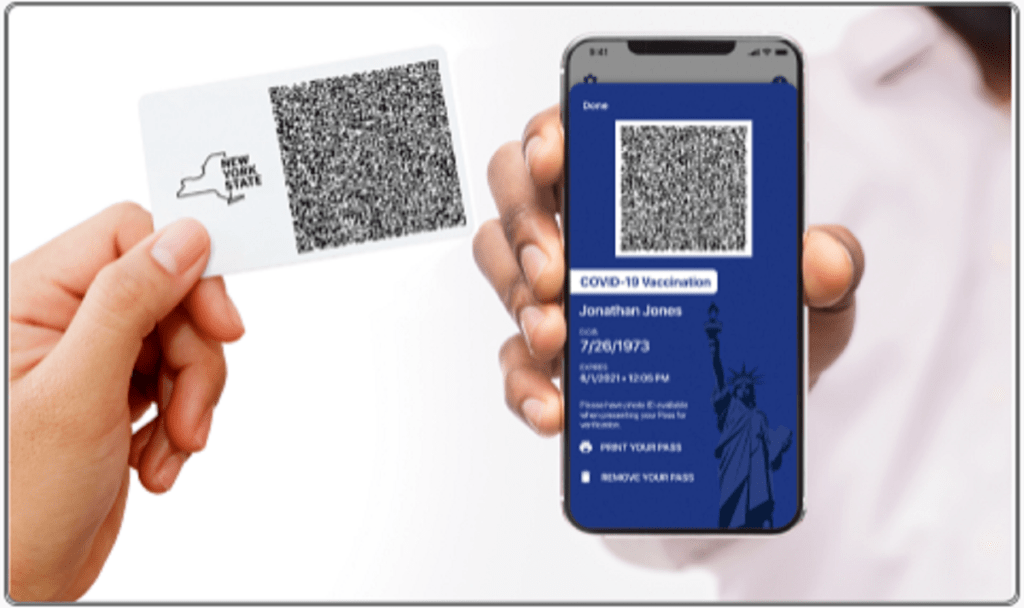Don’t Call It a ‘Passport’

Audio By Carbonatix

Screenshot of state of New York’s Excelsior Pass vaccine passport. Courtesy of CTNewsJunkie.com
Lamont said that this week he has begun to hear requests for a verification system from Connecticut employers.
By Hugh McQuaid, CTNewsJunkie.com
Despite avoiding the term “vaccine passport,” Gov. Ned Lamont’s administration is exploring ways for Connecticut residents to provide digital proof of their COVID-19 vaccine status to businesses or employers.
During a press conference Tuesday, Lamont said he had yet to reach a decision on implementing a state method to prove residents had been vaccinated, but his office was coordinating with nearby states in an effort to adopt a regional approach.
“They all have different ways they want to authenticate to show that you’ve been vaccinated or not. Let’s do this so one system is a platform that works for everybody,” Lamont told reporters in Manchester.
“I’d like to see something done by the end of this month but I want to make sure what we do, we do it right,” he added later. “You know me, if I can do it on a regional basis, I think it makes a lot of sense so we’re talking to Massachusetts and New York as well.”
New York launched a digital verification system, called Excelsior Pass, back in March. The mobile phone app generates a scannable QR code which users can use to demonstrate their vaccination or recent negative COVID test results to businesses and venues in that state. Massachusetts currently has no statewide system.
In April, Lamont suggested that businesses in Connecticut could lead efforts to adopt a similar system here, but those efforts never materialized and the governor’s discussion of vaccine passports provoked pushback from some sectors, including a Democratic lawmaker.
This week, Lamont said he has begun to hear requests for a verification system from Connecticut employers. The new demand has come as employment-conditioned vaccine requirements have become more widespread following the Food and Drug Administration’s final approval of the Pfizer-BioNtech COVID-19 vaccine.
Last Thursday, President Joe Biden announced that federal contractors and businesses with more than 100 employees would need to require their workers to be vaccinated or produce weekly negative test results.
Chris DiPentima, president of the Connecticut Business & Industry Association, said Connecticut business owners immediately questioned how they were meant to verify their workers’ vaccine status. A vaccine passport is the best way to answer the question, DiPentima said.
“Now is the right time to roll it out because businesses are saying ‘Hold on a second. You’re telling me I’ve got to mandate this vaccine, how do I know which of my employees have been vaccinated?’ The passports are certainly the best way to do it. It’s the same across all industries, the same across Connecticut,” DiPentima said.
On Tuesday, House Minority Leader Vincent Candelora said vaccine passport systems have not been successful in other areas where they have been implemented. He worried a passport system could result in confrontation if businesses chose to require proof of vaccination from patrons.
“I’m not sure how efficient that is. I think the conversation needs to revolve around how we can mitigate this process as opposed to people having to disclose their personal health care decisions,” Candelora said.
However, Josh Geballe, Lamont’s chief operating officer, said the app would be entirely voluntary. Geballe also brushed aside the term “vaccine passport” and instead likened it to photos of vaccine records, which some residents keep on their cell phones in order to demonstrate their vaccination status. He called the potential app a “more elegant” and harder to forge verification.
“A lot of people might want the additional convenience of having that loaded in your [digital] wallet rather than having to go fish around for the photo you took back in April when you got vaccinated,” Geballe said. “That’s the concept.”
Although a limited number of Connecticut businesses, like Hartford’s Bushnell theater and BAR nightclub in New Haven, have opted to require some form of vaccine verification, DiPentima said he expects most businesses will be interested in the passport only so far as it helps them comply with vaccine requirements adopted by the government.
“Businesses really aren’t looking to push away, to say ‘Customers coming to my restaurant, prove to me you’ve been vaccinated.’ Businesses wanted to be as less-restrictive as possible on their customer base,” DiPentima said. “A lot of businesses really want to make it easier for customers to experience their business.”
Republished with permission from CTNewsJunkie.com, all rights reserved.
Like what you see here? Click here to subscribe to We-Ha’s newsletter so you’ll always be in the know about what’s happening in West Hartford! Click the blue button below to become a supporter of We-Ha.com and our efforts to continue producing quality journalism.



